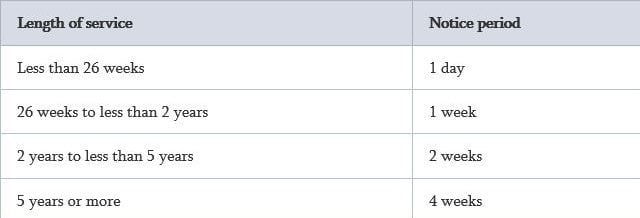




You’ve just been fired.
For the past 2 years, you’ve always been performing well at work. Yet, the reason cited was your poor performance during the Circuit Breaker.
But, wait a minute. Something is fishy, right? You felt unfairly treated but couldn’t do anything about it as you are unaware of your employee rights.
We understand your anxiety and helplessness. In fact, we’ve seen a surge in queries on employee rights and employer obligations for wrongful dismissal during COVID-19.
Fret not, we will explain what constitutes a wrongful dismissal and highlight 4 things you should know when dealing with the situation.

Wrongful dismissal is the dismissal of an employee without just or sufficient cause, as well as failure by employers to follow fair dismissal procedures.
Tripartite Guidelines on Wrongful Dismissal states that a dismissal is only justified when there is evidence of misconduct, poor performance or redundancy. Unfortunately, this grey area has been exploited by many employers during COVID-19 – perhaps including yours.
Let’s look at 3 examples of how wrongful dismissal can happen during COVID-19.
Paul, CEO of Company A is downsizing the company to cut costs and plans to adopt frequent Work-From-Home (WFH) arrangements. He had to decide who to retrench.
Paul felt that women are more likely to be distracted by their children at home and that they would thus be less productive as compared to their male counterparts. Hence, he decided to retrench Janet and her 4 other female colleagues on the basis of poor performance.
Fair employment practices in workplaces are guaranteed by the Tripartite Alliance of Fair and Progressive Employment Practices. Dismissal due to discriminatory reasons, such as the employee’s age, race or disability is unacceptable.
Zoe informed her employer that she is expecting a baby in a few months’ time. Her employer then realized that he would have to pay her maternity benefits even though she will not be at work.
A few days later, her employer handed her a termination notice informing her that she is no longer required at the company.
Dismissal with the purpose of depriving the employee of benefits or entitlements which she would otherwise have been eligible for is not allowed as well. These benefits could include maternity benefits for new mothers or retirement benefits for senior staff nearing their retirement age.
Peter noticed that his employer did not practice safe distancing at the workplace and neither did he ensure other employees do so. Although he raised this issue to his employer multiple times, his words fell on deaf ears.
He decided to make an official report to the Ministry of Manpower. A few days later, Peter was dismissed for insubordination at work.
Employers cannot dismiss their employees for retaliatory reasons to penalize an employee for exercising his employment rights. These rights include filing a claim with the company or even whistleblowing on the company for their transgressions.

Say NO to working in an unsafe environment.
Where physical interaction cannot be avoided due to the nature of one’s work, your employers must adhere to the mandatory requirements for safe management measure at the workplace issued by Ministry of Manpower.
If you are dismissed for resistance to work under unsafe conditions, you have every right to raise a case for yourself.
Because of COVID-19, you may be required by your employer to work overtime or in a new schedule, you disagree with.
You can say no to your employer.
New working arrangements that differ from the original contracted agreement should be properly communicated and agreed upon mutually.
It is the employers’ obligation to implement alternatives that are appropriate to the needs of the employees.
For example, a temporary reduction in salary should be accompanied with more flexible working arrangements allowing the employee to take up side jobs.
But what if you are dismissed because of conflicts on these terms?
If you have been dismissed merely due to a disagreement in the working arrangement, it can be construed as wrongful dismissal.

Source: Ministry of Manpower
Do you remember what your contract stated about your benefits?
Before you can be retrenched, your employer needs to ensure a minimum notice period and compensate for the appropriate amount of retrenchment benefits based on your length of service.
The benefits should be paid in accordance with the employment contract or based on the collective agreement. If there is no prior agreement, tripartite advisories state that this figure should range from two weeks to one month’s salary per year of service.
However, the uncertainties caused by COVID-19 has enticed employers to reduce costs by disguising a retrenchment as a dismissal. They could, for instance, dismiss you for “poor conduct” or “insubordination”. This way, no compensation will be required from them.
When that happens, remember that the burden of proof lies on your employer to demonstrate that you are indeed guilty of those misdoings.
Unfortunately, many of them get away with it as employees are often not aware of their rights. So, make sure you know what is being written in your employment contract!
No two disputes are the same. Mounting a successful wrongful dismissal claim is no simple task.
The first step for most victims would be to submit a mediation request at the Tripartite Alliance for Dispute Management. This would give you and your employer a platform to reach an agreement with the help of a mediator.
However, mediation is not always successful. Should it fail to produce results, a claim should be filed at the Employment Claims Tribunals. This would involve even more legal processes.
Many of you will not have the legal know-how to tackle your cases. Seek professional legal advice early through an experienced lawyer. He will navigate through these rough waters with you.
Here at RBN Chambers, we offer a wide range of legal solutions for both businesses and individuals. In particular, our employment dispute lawyers provide legal advice for all employment disputes including breaches of the Employment Act.
Do feel free to contact us for further enquiries. We will be delighted to assist you in any way possible. In the meantime, stay healthy and take care!

We provide solutions to the table for all our clients regardless of the scale or complexity of the cases. Let us know how we can help.
Contact Us